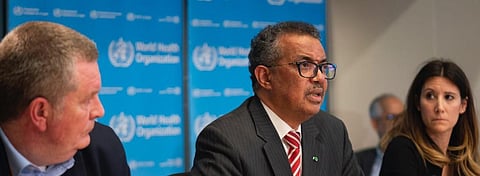

The World Health Organization (WHO) declared the outbreak of novel coronavirus disease (COVID-19) as a pandemic on March 11, 2020. All four pandemics so far in history have been of the flu virus. This is the first pandemic of a coronavirus outbreak.
The fact that the number of cases had risen by 13-fold in the past two weeks and the number of countries affected had trebled, had led WHO to make the declaration 71 days after the outbreak began, WHO director-general Tedros Adhanom Ghebreysus, announced at a press conference at the United Nations health body’s headquarters in Geneva.
The global tally of cases has reached up to 124,968, spread across 122 countries. As many as 4,585 deaths have taken place.
Such a ‘labelling’ of the outbreak should not be construed to mean that it could not be controlled or the death rate was going to go up, WHO officials clarified. Down To Earth (DTE) had reported on March 9 that it was imminent that WHO would declare the outbreak a pandemic.
Countries should adopt a comprehensive strategy that involved working on both, controllability and mitigation, officials said. Controllability meant interrupting the chain of transmission of the virus by tracing more and more contacts of confirmed people.
Mitigation meant preparing health systems to be ready enough to isolate and treat people with whatever means possible to reduce the impact on health.
WHO made this declaration only to advise countries to become more ‘aggressive’ in their approach and not to have any major change in tact. It called upon countries to step up emergency response and multiply contract tracing efforts.
The UN body was not only alarmed at the rising level of severity of the disease but also the inaction of many countries, Ghebreysus said. In fact, inaction was also counted as one of the factors behind this declaration.
The WHO officials refused to name or give a number of those countries that had not acted but did qualify what they meant by inaction.
The first criterion of inaction was limited testing, that is, the case definition of testing being limited to those who had been in contact with a confirmed case or had a travel history of one of the COVID-affected countries.
DTE had reported on March 6 that India’s tests were also limited as the country had tested only 4,000-odd samples till March 5. India has reportedly expanded the criteria but the number of people being tested still remains low.
The second criterion of inaction was improper communication by the governments with the population and creating some confusion. Some of Indian advisories too have led to this, with one asking Indians to avoid exposure to all live animals’ markets although even the WHO does not give such blanket recommendations.
Improper communication between a central and its state governments was also counted as one of the factors. The response in India, to some extent, also has been fraught with this anomaly as state governments officially go on confirming cases but the Union Ministry of Health and Family Welfare either confirms them too late or does not count them on the same day.
The other criterion of inaction has been that countries have been too willing to give up on contract tracing at a very early level of the outbreak and have a deep distrust in health messaging between health workers and systems.
“If countries ask themselves whether they have any of these problems, they would be able to realise how inactive or active they are,” Mike Ryan, WHO’s emergencies programme director, said.
Italy and Iran are two worst-affected countries after China, with 12,642 and 9,000 cases respectively. Iran, the WHO said, is facing a shortage of ventilation, medical oxygen and other necessary wherewithal to combat the outbreak.
“The fact is both these countries are facing tough times but I can guarantee you that many more countries could be facing a similar situation soon,” Ryan warned.